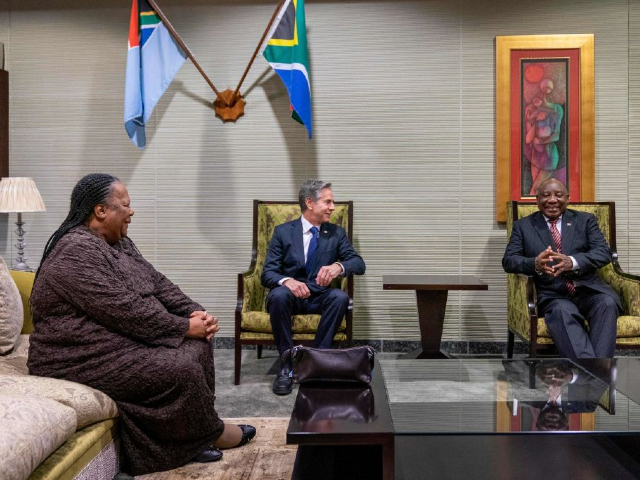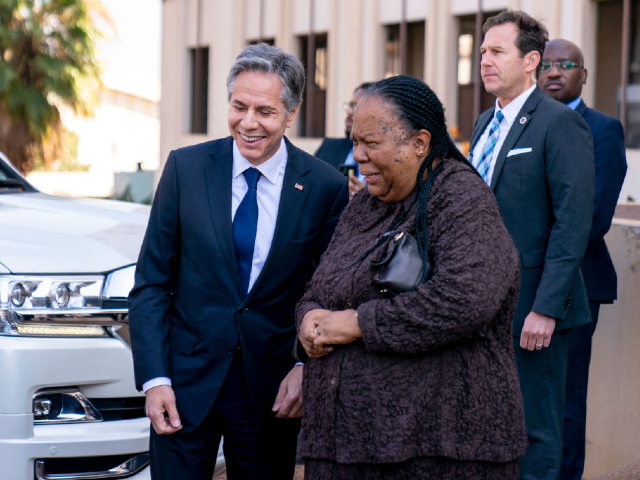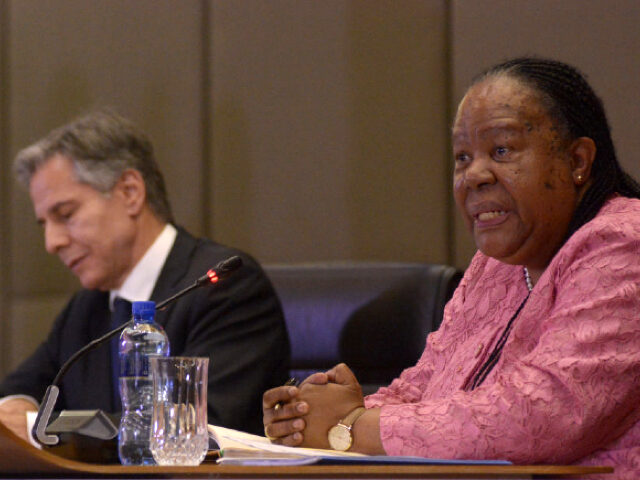South African International Relations Minister Naledi Pandor lectured American counterpart Antony Blinken on Wednesday in remarks highlighted by the news portal All Africa, saying that Western nations are “bullying” the continent and denouncing democratic states seeking “to teach a country” how to be free.
Pandor and Blinken held a joint press conference on Monday as part of Blinken’s visit to South Africa – one stop on a tour that includes several African and Southeast Asian American allies. While Pandor complained that wealthier countries approached her, as the top representative of South Africa, with an attitude of “either you choose this or else,” Blinken lamented, “we all have our shortcomings,” promising not to approach the relationship as if the United States has greater leverage.
Ties between Washington and Pretoria have deteriorated as South Africa’s leftist government has cemented ties with Russia and China. South Africa is a member of the BRICS economic coalition – which unites it with China and Russia, as well as India and Brazil – and a member of China’s Belt and Road Initiative (BRI), a global debt-trap scheme to colonize poor countries with expensive infrastructure projects they later cannot pay. Blinken has notably refrained from discussing China’s colonization of Africa in-depth during his visit to the continent, instead focusing on the far less severe threat emanating from Moscow.
Pandor described her talks in private with Blinken as “extensive and excellent” and repeatedly emphasized that she did not feel that Blinken, personally, had been overbearing about America’s interests in the region. Nonetheless, Pandor insisted that Western nations had otherwise made South Africa uncomfortable with “bullying” language.
“We’ve all heard that narrative, that South Africa and the continent as a whole are the latest playing field in the competition between great powers. That is fundamentally not how we see it. It’s not how we’ll advance our engagement,” Blinken promised, prompting gratitude from Pandor.
“I’m glad that Secretary Blinken has confirmed that America is not asking us to choose. I don’t recall any attempt by the United States to do that. But in terms of our interaction with some of our partners in Europe and elsewhere, there has been a sense of patronizing bullying toward ‘you choose this or else,’” Pandor explained.

From left, South Africa’s Foreign Minister Naledi Pandor, US Secretary of State Antony Blinken and South Africa’s President Cyril Ramaphosa meet at Waterkloof Airforce Base in Centurion on August 9, 2022. (Photo by Andrew Harnik / POOL / AFP)
“One thing I definitely dislike is being told ‘either you choose this or else,’” she continued. “When a minister speaks to me like that, which Secretary Blinken has never done but some have, I definitely will not be bullied in that way, nor would I expect any other African country worth its salt to agree to be treated.”
Pandor went on to complain that foreign nations sought to improve democratic institutions in South Africa.
“Your overall strategic intention might be to advocate for democracy and support its presence on the African continent. However, if your tactic is to approach African countries and say that, listen, you must be democratic either and use our model, it works, I think it’s bound to lead to some failure,” Pandor said. “[T]o come in and seek to teach a country that we know how democracy functions and we’ve come to tell you, you do it, it’ll work for you – I think it leads to defeat, so we need to think in different ways.”
While Blinken largely abstained from commenting on China, Pandor emphasized that South Africa, and all African countries, would “relate to China … [in] whatever the particular form of relationships” they chose.
“We can’t be made party to conflict between China and the United States of America, and I may say it does cause instability for all of us because it affects the global economic system,” she said.
Blinken praised South Africa as “a leading global voice on global health, the climate crisis, democracy, security, so much else” and, to the extent that he discussed tensions with China over its many intellectual property crimes, human rights atrocities, and belligerent foreign policy, he objected to China’s refusal to continue climate change talks with America.
“That’s not punishing the United States; that’s punishing the entire – the entire world and especially the developing world, and notably Africa, because China and the United States are the number one and number two emitters in the world,” Blinken said.
The Chinese Communist Party announced last week that it would suspend talks on climate change with the leftist administration of President Joe Biden, which has prioritized strengthening ties with China on the grounds that it is necessary for the environment, in response to Speaker of the House Nancy Pelosi (D-CA) spending 19 hours in Taiwan last week.
Despite Pandor stating repeatedly that she did not object to Blinken’s form of diplomacy, Blinken criticized the United States for “inconsistencies” in its approach that it should improve.
“In terms of inconsistency, sure, I think it’s – we have these conversations, and we like to think that we’re engaged consistently on every issue. But we all have our shortcomings,” Blinken concluded, “and we can probably look back at a number of things that suggest that we’re applying principles in one place in one way but not the same way in another.”

US Secretary of State Antony Blinken and South Africa’s Foreign Minister Naledi Pandor speak to to each other after attending a Women’s Day Event at the South African Medical Research Council in Pretoria on August 9, 2022. (Photo by Andrew Harnik / POOL / AFP)
Blinken has repeatedly engaged in self-criticism as a form of diplomacy while on the international stage representing his country. In his first major dialogue with top Chinese diplomats – taking place in Anchorage, Alaska, in March 2021 – Blinken appeared to largely agree with senior Chinese Politburo member Yang Jiechi’s support of the leftist Black Lives Matter movement and criticism of racism in the United States, abstaining from forcefully condemning China’s genocide of Muslim ethnic groups in occupied East Turkistan.
“On human rights, we hope the United States will do better on human rights. China has made steady progress in human rights, and the fact is that there are many problems within the United States regarding human rights, which is admitted by the U.S. itself as well,” Yang declared in a 16-minute rant that violated previously agreed-to time constraints. “The challenges facing the United States in human rights are deep-seated. They did not just emerge over the past four years, such as ‘Black Lives Matter.’ It did not come up only recently.”
Blinken similarly allowed Chinese Foreign Minister Wang Yi to lecture him with little response in November, complaining that America was “treacherously” maintaining friendly relationships with the free government of Taiwan, a sovereign nation China illegally claims as its own.
Wang presented Blinken with an “updated list of U.S. wrongdoings that must stop” during their last meeting in July, which lasted five hours.

COMMENTS
Please let us know if you're having issues with commenting.